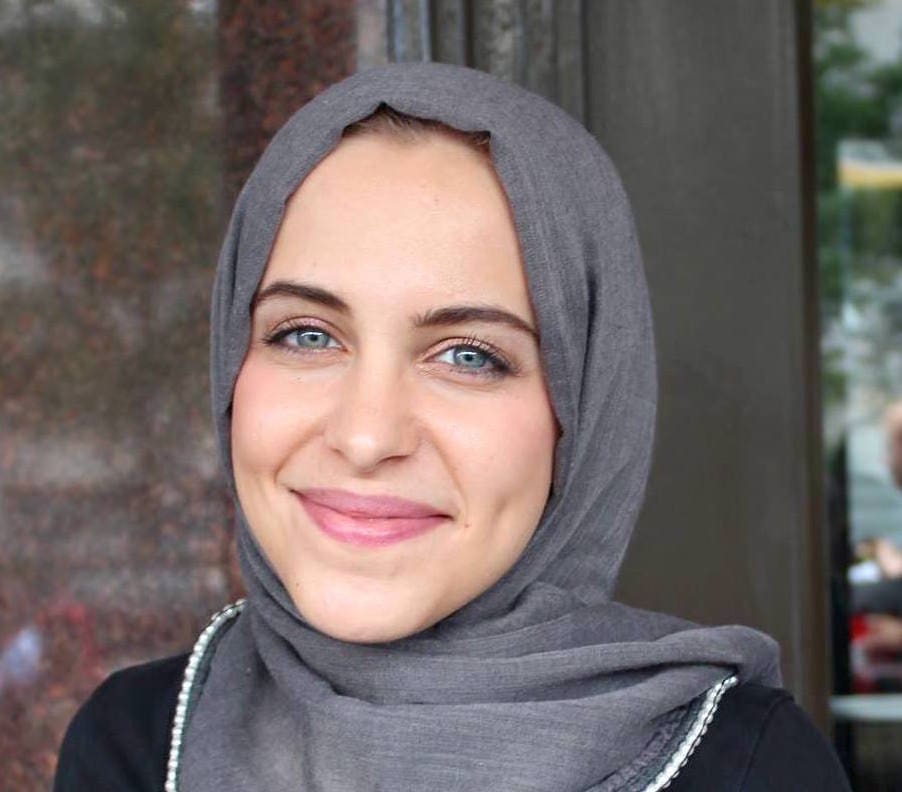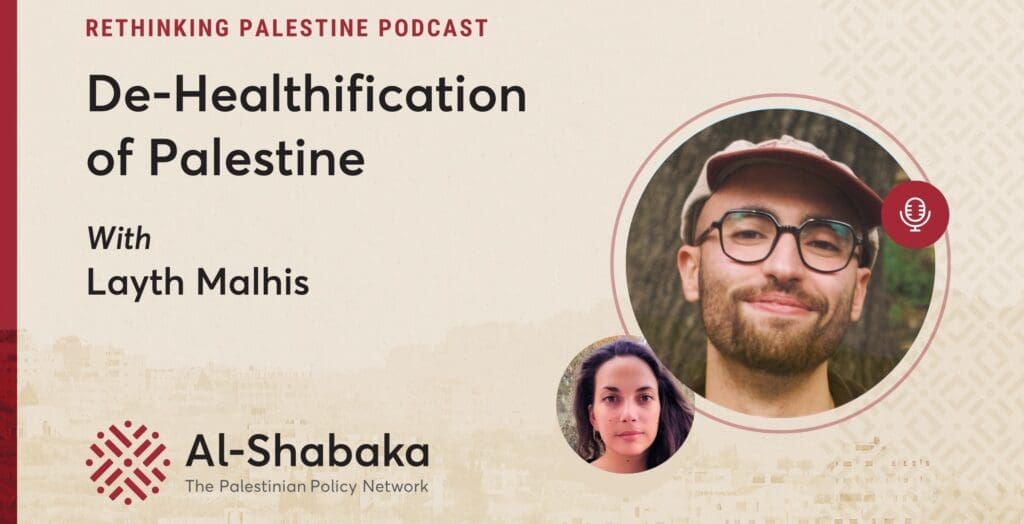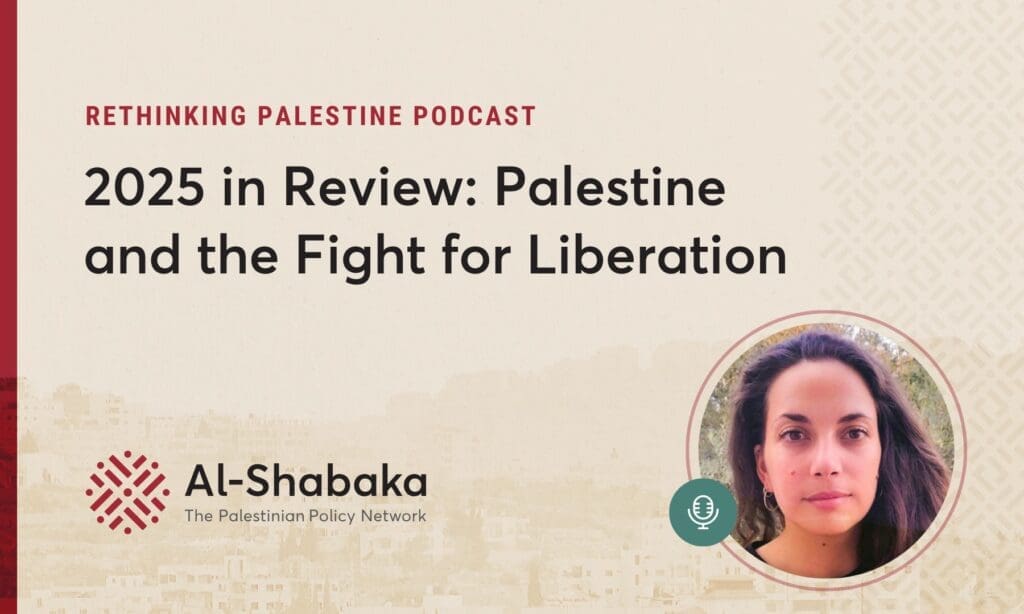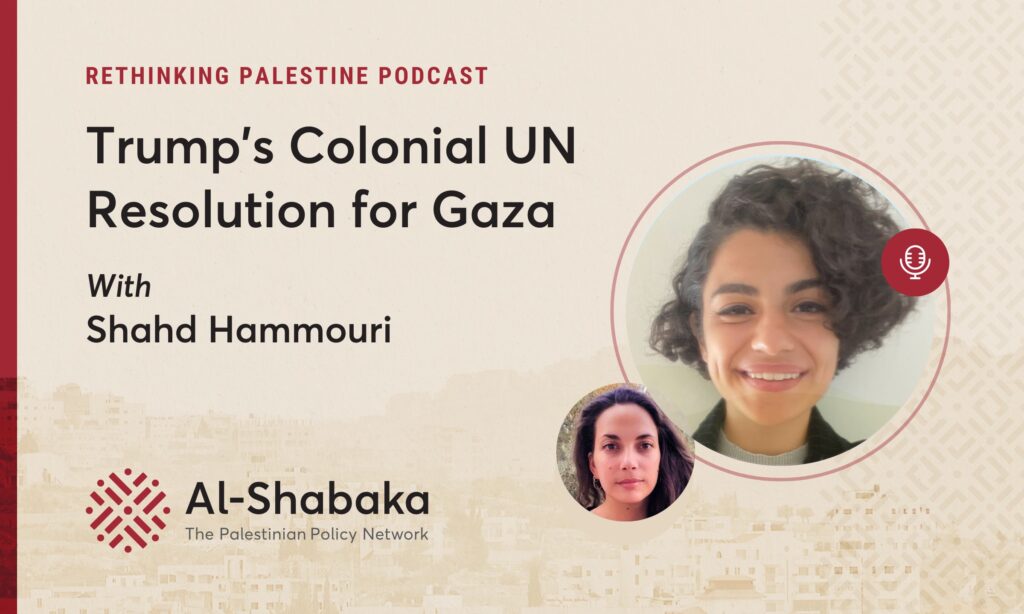About This Episode
Episode Transcript
The transcript below has been lightly edited for brevity and clarity.
Halah Ahmad 00:00
Up to 4 million tourists come each year to historic Palestine, and most of them visit Jerusalem and the dead sea. There’s a clear connection here between both not only the displacement and the illegal land theft, that predicates tourism at these illegal settlements, but also the economic deprivation that, and suppression that results from that as well.
Yara Hawari 00:31
This is Rethinking Palestine, a podcast from Al-Shabaka: The Palestinian Policy Network, a virtual think tank that aims to foster public debate on Palestinian human rights and self-determination. We draw upon the vast knowledge and experience of the Palestinian people, whether in Palestine or in exile, to put forward strong and diverse Palestinian policy voices. In this podcast, we will be bringing these voices to you, so that you can listen to Palestinians sharing their analysis, wherever you are in the world.
Next month, the Israeli regime is set to open its borders to tourists who meet the various COVID requirements. After over 18 months of being pretty much closed. Its tourism industry has taken a serious blow. As of course has the Palestinian tourism industry. Now we may think of terrorism as a rather benign aspect of the Israeli apartheid regime, but actually, it plays a key role, specifically religious tourism in legitimizing and expanding Israeli theft of Palestinian land.
Joining me to discuss this on this episode is Halah Ahmad, a writer and policy analyst with a particular focus on social welfare, equitable development, and economic justice. She’s also a former US policy fellow with Al-Shabaka. Now Halah wrote a policy brief on this topic, entitled tourism and the service of occupation and annexation, which was published last year.
Halah Ahmad 02:06
Thank you so much for having me, Yara.
Yara Hawari 02:07
Perhaps we could start off with a historical background on Zionist tourism in Palestine and how this contributed to the establishment of the state of Israel in 1948 on top of what is now colonized Palestine.
Halah Ahmad 02:22
Thank you so much for hosting this topic in this podcast, Yara. It’s true that this issue of, tourism them in service of occupation and annexation and in service of the Zionist settler-colonial project has a long history. And in fact, you know, despite COVID-19 closures, the Israeli state has been working to dramatically build out its tourism in the occupied territories, in preparation for the return of tourists.
In preparation for the turn of administrations and support presumed within the White House with the change of hands from the Trump administration to the Biden administration. So, in fact, it’s a crucial time to talk about this, but let me back up a little bit and start with the early days of the Zionist colonization of Palestine
In the lead-up to world war two, the Zionist movement did not have the kind of widespread support you might expect for a colonial effort that was just a few years away from committing the Nakba displacing close to a million Palestinians and establishing the state of Israel. And many European Jews were not convinced that an ethnoreligious state made sense.
You know, they spoke different languages, were embedded in different civil and political life throughout Europe. And of course, there are a lot of things that changed the calculus for the success of Zionism and the settler-colonial movement that it represented. But earliest Zionist settlers in that vein founded what was called the Tourist Development Association of Palestine and that entity alongside the Jewish Colonization Association, were key actors in the social and economic project, which was being undertaken for Zionist colonization of Palestine.
And they engaged in a number of projects to encourage migration to Israel, what they would call Israel. So some of the activities of the Tourist Development Association of Palestine included the creation of posters, the commissioning of posters, it included the commissioning of maps and in coordination with the Jewish Colonization Association also included other areas of touristic investment, including hotels.
Just to give a picture of what those looked like. You know, some of the posters, the most famous example of which is the Visit Palestine poster by friends, crowds. It pictures a silhouette of an olive tree in the foreground and looks out on the old city of Jerusalem, which has sort of a glow and orange, yellow hue greenery, just within the walls and dome of the rock in focus.
It was among many posters with a vibrant landscape, but also many religious symbols, which were meant to sort of creating part of this important mythology that the Zionist colonization efforts relied on to build the case for migration to Palestine. In addition to those posters, as I mentioned, were Zionist maps, which would impose, presumed biblical sites on top of existing cities and topographies to create a visual anchor, both for Christian and Jewish audiences to see the land of Palestine through the lens of antiquity and create an image that there was this empty land of Palestine and imaginary of Jewish continuity there. And the maps actually became serious anchors for planning, extensive colonial settlement. That would then actually obscure, and erase indigenous Palestinians from the landscape.
And these posters were important for establishing a number of founding myths and characterizing the landscape in ways that are very similar to other colonial movements of the time. The founding leaders of the Zionist movement, famously David Ben-Gurion and Moshe talk. The first and second prime ministers of Israel used explicitly pejorative views to characterize the Palestinians living there at the time. They would say that they would bring modern cultural and scientific knowledge to make the wilderness bloom. And they would bring this sort of intellectual labor to Palestine. And in some cases explicitly reflect that Zionists had come to conquer the land from people who had been inhabiting it with what he called savage culture.
These were images and ideas that were reflected back in some of the tourist development materials, the posters that were put forward. And in fact, you know, surprisingly, despite the relative poverty, that many Zionists will talk about for early Zionist settlers in Palestine, several dozen hotels emerged between 1917 and 1948, and some are still standing, including, you know, the king David hotel in Jerusalem.
So tourism was a fundamental part of the bounding mythology and the founding ideology for settling in Palestine and erasing Palestinians from the landscape, but also characterizing Jewish settlement as a sort of natural continuity with the past, which rested on, of course, the ethnic cleansing of Palestinians.
Yara Hawari 07:20
Halah, you mentioned that really key to all of this was erasing Palestinians from the landscape. Can you explain to us a bit more how this was and continues to be done through the merging of archeological practices with biblical narrative?
Halah Ahmad 07:39
Archeology becomes much like tourism hand in hand, a political tool for Palestinian erasure Edward Said writes about this in Orientalism.
There was a concerted effort by Zionists to remove Palestinians from historical records. And this was done through selective archeology and sort of an Orientalizing depiction of indigenous Palestinians. As, as I said, uncivilized, unadvanced. All of this is relative to this European settler population.
This was very important after the Nakba because although early Zionists were very clearly and self-described as a settler-colonial movement after 1948, they sought to transform that identity. Both internally and externally. And certainly wanted to quash any claims, Palestinians to indigeneity and statehood.
So Zionists use archeology as a tool to continue legitimizing their claim to the land that they had confiscated by force. And so the fields of archeology, this is a very deep topic and there’s a lot of contestations in the matter in Palestine. And I only treat it very lightly in the brief, but a great source on this as Nadia Abu Alhaj her book facts on the ground. She writes about the ways in which in the fifties and sixties Zionists would treat archeology as a kind of national hobby. It was both communal activity and, and communal recreation and tourism around historic Palestine.
And the key focus of that archeological project was to validate the founding myths of this territorial claim of these European Jews to the land, which meant whether the archeology was scientifically rigorous that’s another question, but it was very important to try to lay facts on the ground. As Nadia says, surrounding this idea of Jewish continuity and Palestine, and particularly drawing on religious symbols and ideas as evidence. In some cases, archeological sites will have very little tangible artifacts let’s say, but a lot of biblical narratives surrounding them. And that, that becomes very important in many of the sites that were focused in that time became key touristic sites in the precedent.
So archeology and tourism are tied to a nationalistic practice of that. It continues to be central, both in Palestinian lands theft and legitimization of the Israeli colonial project across historic Palestine. And this is especially true, I would say, in the West Bank and Jerusalem, which I’m sure we can talk about more modern examples of the ways that archeology is used in the displacement of Palestinians.
Yara Hawari 10:17
And Halah you mentioned importantly, that archeology became a hobby for a lot of Zionists in the early days. And indeed, actually many archeologists in the sixties and seventies were former army generals during the Nakba. And it was said that they would carry a trial in one hand and the old Testament in the other.
And I think that’s really a testament to what they were searching for and what kind of archeological practices they were engaging in. And as you said, this to today. And I think, one example of this par excellence is what’s happening in said land. The Palestinian neighborhood in Silwan. The Zionist regime is literally digging archeological tunnels under the homes of Palestinians, dislodging, the foundations of these homes in the service of what they call archeology, but also tourism to put on a full display of continuous and ancient Jewish history in the city and much of that archeology and the archeological practices are actually contested by various different international bodies.
Halah Ahmad 11:23
There are several of heart and examples in Jerusalem that we could talk about and the backbone to much of that problematic, to put it lightly, archeological practice in Jerusalem is that there are two primary right-wing settler organizations that are operating in Jerusalem and seeking to, in their own terms really, Judaize the neighborhoods of East Jerusalem create a different demographic reality. And the two are Elad and Ateret Cohanim. And Elad, very interestingly as a right-wing settler organization, (very explicit right-wing ideologies) owns the primary contract for archeological work in Jerusalem.
In fact, they are meant to be a nonprofit organization, but a lot of their finances are private because of this very crucial, let’s say, archaeological contract that they have with the government. And, you know, they have this famous center that many, many religious tourists stop at the air David center and the city of David national park and Wadi Silwan
These centers create heavy policing within the Palestinian neighborhoods, but they are on confiscated land. And the archeological projects that they have undertaken are putting many, many Palestinians at risk of eviction. In Al-Bustan neighborhood, there was an eviction order for 1300 or 1500 families. That was particularly for an archaeological sort of theme park to be built in place of their homes. And this is just one of the multiple examples, not only in an effort to Judaize the neighborhood but also to use archeology. And also the pretense of that archeology is to expand as well. The Bible trail, what they call the Bible trail, throughout east Jerusalem.
All of these archeological pretenses are in service of displacement and ethnic cleansing of Palestinians in Eastern Jerusalem. So the tie there is very explicit and explicitly backed by the Israeli state as well.
Yara Hawari 13:21
If you’re enjoying this podcast, please visit our website, www.al-shabaka.org, where you will find more Palestinian policy analysis, and where you can join our mailing list and donate to support our work.
Yara Hawari 13:35
And part of that religious tourism also takes place in illegal settlements in the West Bank. Can you outline what the impact of this is on Palestinians there?
Halah Ahmad 13:47
There’s so much to say here, it’s hard to give a full picture, but at baseline, the tourism and illegal settlements in the West Bank represent almost the most basic example of Israeli apartheid.
What happens is in the simplest terms: illegal settlers claim the land, build on it, are later recognized by the Israeli government. They build roads to, and from the settlements that Palestinians cannot use and they build touristic enterprises on that land. They then host tourists, particularly Christian tourists, and completely obscure and hide the theft and the military rule.
Then it enables them to be there on Palestinian land. They both profit from this enterprise and, exclude Palestinians from those historical, cultural and touristic sites, which would otherwise benefit the Palestinian economy. This is a violation of Palestinian self-determination and their right to sites of cultural, religious, and historical significance. And really, it’s a spit in the face of Palestinian claims to statehood.
So now you have the brutal Israeli occupation forces protecting these sites. And on top of that, you have Palestinian deprived of this economic development. The tourists leave these sites with a false and constructed narrative of what the West Bank is like with a confused notion of Palestinian realities within the West Bank in particular with the Israeli occupation. And frankly, oftentimes with the reinforced Zionist narrative, that age old narrative of superior is really development in contrast to Palestinian development, which is suppressed by Israel and really predicated on Palestinian oppression. So to give a scale of how much this is happening, settlers and the illegal settlement enterprise may account for some would say, up to 10% of the territory of the West Bank.
But actually a UN human rights council report found that settlement councils control actually over 43% of the west bank. And as part of that, 86% of the Jordan valley and the dead sea, which are key areas, not only for, for tourism, but also rich agricultural resources as well. So there was actually a PLO report that was put out in 2017 to talk a little bit about the direct ways that the Israeli state is partaking in depriving the Palestinian economy of the benefit of its own tourism sector and towards some resources.
And it found that had area C, which comprises 60% of the West Bank, which means it’s under complete Israeli military rule. If that was transferred to Palestinians under the long-failed Oslo Accords, there would be an unprecedented increase in the GDP of the Palestinian economy, up to 35%. And you know, you have up to 4 million tourists coming each year to historic Palestine, and most of them visiting Jerusalem and the Dead Sea.
There’s a clear connection here between both the, not only the displacement and the illegal land theft, that predicates tourism at these illegal settlements, but also the economic deprivation and suppression that results from that as well. In addition to the narrative piece that we’ve talked about, there are many examples.
Yara Hawari 16:57
Right. And very often the tourists don’t even realize that they are entering into the West Bank. Israel blurs, those blinds on purpose. They bus in tourists to Bethlehem and they bust them out. And they also bus them into the illegal settlements and to the unknowing tourists. They are still in Israeli territory.
They have, they have no idea that they’ve crossed into what’s internationally considered as Palestinian territory. Now the Israeli regime is said to be opening up its borders to tourists next month, November and we already know of course that the first people that will be here will be Christian Zionist groups coming from the U S and as you write in your policy brief, these groups consider it a Rite of passage to visit the holy land.
So what, what exactly does that mean? And what does that entail for this group?
Halah Ahmad 17:52
It’s very important to understand the role of Christian Zionists here, and then the dominant role that they then play as tourists in this economic engine for the continued theft of Palestinian land. The major advocacy organization in the United States that represents Christian Zionists is Christians United for Israel. And it boasts 10 million members. That is a hundred times as large as the members that represent APAC, which is the most notorious pro-Israel and Zionist lobby in the US and Christian Zionists and the largest and most significant source of support for Israel, both as an electorate and as donors. And in coordination with Jewish Zionists groups, Christian Zionists have successfully conflated Christian religious identity with support for Israel.
And that’s what it means to talk about this as a Rite of passage. This is an explicit effort to use tourism as a political tool. To use religious tourism, especially, to create support for Israel as part of Christian identity. The two things that Christianity and support for Zionism would seem so distinct particularly because Christian Palestinians have long preserved Christian traditions and belief in the holy land, but are naturally opposed to Israeli, apartheid, colonization, and oppression of Palestinians, which affects even their own practice of their faith whether it’s practicing or celebrating Easter or Christmas or whatever, it may be.
The occupation forces will no less obstruct their lives as Palestinians. So evangelicals believe that supporting Jewish migration to Israel brings them closer to the return of Jesus. Oddly enough, when they also believe that Muslims and Jews alike would be annihilated and there is a case study of a Christian Zionist group that I talk about in the brief, which is really emblematic of the kinds of religious tourism that become extremely complicit in furthering the settler colonial agenda.
So the example is, is Passages. It’s a US-based group that was modeled after the birthright trips that are much more notorious. And they provide a free trip to Israel for Christians at over 150 universities across the United States. And this includes many Christian colleges, but also a number of major public universities. Texas A & M, the University of Florida, the University of Minnesota host these trips and they have over the past six years or so, they’ve got 7,000 students to Israel. Now, the trip itself, it is not political as much as it is also meant to be ostensibly religious. It was the brainchild of the former Israeli ambassador, Ron Dermer who hosted the launch of this program at the Israeli embassy in DC with none other than other former ambassadors, Michael Oren, and most recently, David Friedman.
And the trip is meant to encourage this Christian support for the Zionist state. Quite cynically, the itinerary is quite explicit in its support for the Zionist colonization of Palestine. They visit the Syrian-occupied Golan Heights on the itinerary. And this is based on research that was done by the Friends of Sabil North America and alongside some Palestinian student solidarity groups on campuses, to give them credit for that great research.
And they explore Israeli startup culture. They tour the Knesset. They learn about Christian and Jewish persecution in the Middle East. And the idea here is that they are centering a very different narrative around Israel.
First of all, leaning on that historic colonial mythology, that Jewish settlement was this sort of modernizing force in Palestine of the more uncivilized, as they would say, Palestinian population. This focus on Israeli modernity is very problematic in that sense. And then visiting occupied territory, the Golan Heights flies totally in the face of many, many other trips that would even attempt to build a so-called two-sided perspective let’s say of the issue. So what it does is it makes Christian tourism and Palestinian oppression really kind of two sides of the same coin. By reinforcing this idea of Jewish continuity in Palestine and really overlooking any of the land theft that predicates this tourism industry. In fact, they even visit Sderot, which is a small city near Gaza. No religious significance at all, but was notorious in 2014 for residents putting up lawn chairs to watch the assault on Gaza, which killed 2000 Palestinians and 73 Israelis in the process as well. And those kinds of itineraries are very clear and explicit in their attempt to create particular sympathies for the Zionist project. And it’s a major source of continued support for the state of Israel among, especially Christian tourists from the US.
Yara Hawari 22:56
Now Halah, we’ve given a lot of space as to what the Israeli regime is doing and what Christian Zionists are also doing, but I really want to end on Palestinians and really hone in on how they have resisted this because obviously, they have not been passive. And so, I wanted in the final question, I wanted to ask you how have Palestinians resisted this form of settler-colonial tourism. And in that same tangent, what are the alternatives for people who want to practice tourism that is in solidarity with the Palestinian struggle.
Halah Ahmad 23:33
So firstly, Palestinians of course have never responded to this passively, this effort to erase their narrative. Palestinians have consistently both applied to build on their own touristic sites, whether it’s an east Jerusalem or in the West Bank and the PLO documents that many of those endeavors to develop their own cultural and touristic resources are denied by either the Israeli ministry of tourism or the Israeli military. Runs the occupation of the west bank. And yet Palestinians have created alternative itineraries. Both Palestinians in historic Palestine, and throughout the diaspora have created together alternative itineraries for both recreational and religious tourism that doesn’t cross the picket line, so to speak, and avoids complicity with a settler-colonial enterprise.
And Palestinians continue to manifest the reality of the apartheid system by being the first to document companies that have been complicit in the theft of their land and in the illegal settlement enterprise. Alhaq is one organization that has done immense research on this much before groups like Amnesty International took up the helm as well to identify companies that have been complicit in this tourism industry on Palestinian stolen land and members of Palestinian civil society have called for tourisms to engage in ethical tourism that does not go to touristic sites that are run by Israeli authorities and claimed as Israeli sites within Palestinian territories. And there’s a lot to say on that topic, but there are a number of resources and alternatives for people.
The Palestinian academic and cultural boycott put out a series of resources for creational and religious tourism. Eye Witness Palestine has a number of resources as well. Walk Palestine, the C Dodge center for Holyland studies and on campuses throughout the United States as well. And even the UK, Palestine treks as they call them, are growing at campuses to provide an alternative, to see Palestine from a Palestinian perspective, without being complicit in the theft of Palestinian land and the continued oppression that Palestinians face across historic Palestine.
And these are really important because as I mentioned during the period of COVID-19 and prior tourism has been an explicit strategic investment of the Israeli state. When Trump took office in 2016, Israel celebrated by approving what was a pretty unprecedented $20 million in settlement funding and the then tourism minister and Netanyahu both had emphasized that tourism sites and construction of hotels in the west bank settlements were primary targets for those funds and then anticipating potentially a turnover in administration in January 2020, a defense minister, Natalia Bennett approved the construction of national parks, nature reserves in the west bank as part of over 110 million spent in the first quarter of the year on West Bank settlements, which was the highest in a decade. And even definitely several times more than even the unprecedented numbers in prior years that had been spent.
So tourism continues to be an explicit strategic priority because it is part of the larger effort to legitimize the settler-colonial project that continues in the west bank and the theft of Palestinian land in east Jerusalem and throughout the west bank.
And it is an economic engine for that enterprise as well. but there are alternatives and investing in those alternatives in Palestinian tourism is both a way to economically support Palestinians and be in solidarity with them as they, resist the apartheid regime that exists across historic Palestine.
Yara Hawari 27:17
Another great resource is the grassroots Jerusalem book Wujood, which was published a couple of years ago about now, which is a guidebook to Jerusalem and promotes much more politically responsible tourism and really focuses on Palestinian existence within the city.
Halah you’ve in such a short time very clearly and succinctly laid out how Israeli tourism and the Israeli tourism industry contribute to the theft of Palestinian land and is deeply complicit and active in the oppression and continued occupation of the Palestinian people. So thank you so much for joining me. I’d love to continue this discussion but I think we’ll leave it there for now.
Halah Ahmad 28:05
Thank you so much for having me.
Yara Hawari 28:10
Thank you for listening to Rethinking Palestine. Don’t forget to subscribe and leave us a review. For more policy analysis, and to donate to support our work, please visit our website: www.al-shabaka.org. You can also follow us on Facebook and Twitter.
Halah Ahmad is a policy researcher, writer, and policy communications expert. Most recently, she led legislative affairs as VP for Policy at the Jain Family Institute, an applied social science research institute based in New York City. Halah also served as the US Policy Fellow for Al-Shabaka, and has conducted strategic policy research for government agencies and NGOs in Greece, Albania, Germany, Palestine, and the US. Halah received her Masters in Public Policy from Cambridge University as a Harvard-Cambridge scholar. Her work has been featured in The New York Times, Vox, The LA Times, The Hill, USA Today and other outlets.
Al-Shabaka: The Palestinian Policy Network is an independent, non-partisan, and non-profit organization whose mission is to convene a multidisciplinary, global network of Palestinian analysts to produce critical policy analysis and collectively imagine a new policymaking paradigm for Palestine and Palestinians worldwide.

















